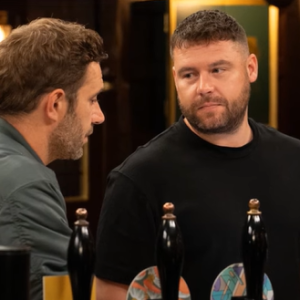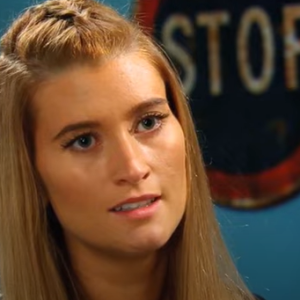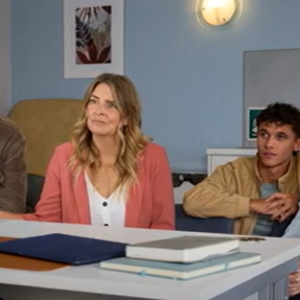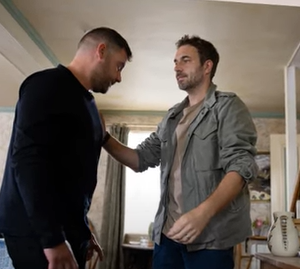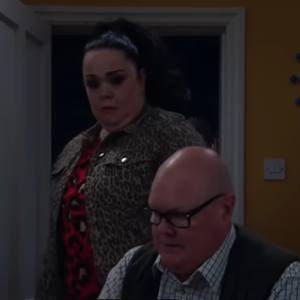The moment fans have been aching for finally arrives with a raw, breathless intensity that refuses to be tidy: Robert returns on the exact day Aaron marries Jon, and what should have been a polite nod instead explodes into the kind of charged reunion soap operas live for, because there is history clenched between them like a wound that will not heal. From the instant their eyes meet there is a current — a kiss, a falter — and the memory of everything they once were flashes across both their faces; yet this is no romantic relief, it is a collision with consequences, because Robert has not come home to be sentimental. He has come with a suspicion that has hardened into conviction: Jon is not the steady, harmless partner he pretends to be, and Robert’s quiet, obsessive search for the truth about Nate’s death has sharpened into something dangerous. The outrage in Robert is not theatrical but rooted in loss and doubt; his return is less about reclaiming the past and more about dismantling the polished present Jon has built, which makes every exchanged look a fuse waiting to ignite.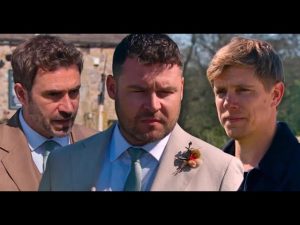
What follows is a terrifying demonstration of Jon’s capacity for control; the spoiler clip peels back his polished surface and reveals a strategist who curates reality until it bends to his advantage. He engineers innocuous moments to needle at Robert’s trauma — placing young Harry in situations that prod at old wounds, creating cacophony and chaos to make Robert appear unstable — and when Robert predictably snaps, Jon is there to collect the pieces and present them as proof of Roberts’ decline. The construction is chilling: rather than simply gaslighting with words, Jon builds scenarios, times entrances, and presides over scenes like a director staging an inevitable downfall. That kind of calculated cruelty is more frightening than any shouting match because it is invisible to everyone who wants to believe Jon is honest; it’s the slow, skillful distortion of perception that can send a man spiralling and, if unchecked, make suspects of those who love him most.
Robert’s breakdown is messy and human — not villainous spectacle but the sound of a man finally cracking under the weight of grief, paranoia and guilt. He storms from the room, destroying what he can reach, an eruption that is the physical translation of years of armor splintering. This is not mindless violence; it is the sound of panic and heartbreak. Crucially, the emotional fulcrum of the scene is Aaron, who finds Robert after the storm and pulls him back from the edge. Their reunion is not fireworks but a softer, agonising recognition: they still fit together in ways that no other relationship can replicate. Their physical reconciliation is tender and complicated, an admission neither of them seeks to name. They don’t pretend to rewrite the past or promise a tidy future — they simply cling to a truth that demands acknowledgement. That unlabelled intimacy is what makes the scene powerful: it is real, fragile, and terrifies because it threatens everything Jon has constructed.
The aftermath ratchets the stakes even higher. Aaron and Jon begin making plans to leave the village — a move that would sever the fragile tether Robert had when he returned, and would punish him for daring to seek the truth. Robert’s motives were never ambiguous: he came back for Aaron. If Aaron departs, it tears the core reason for Robert’s return in two and leaves him exposed. Jon’s mask begins to slip; the deliberate set‑ups and cold calculations suggest he is not merely defensive but prepared to escalate if his control is threatened. With Robert joining dots and smelling the rot beneath Jon’s sheen, the villain on the inside becomes more dangerous because he is precise and practiced. The narrative implication is clear: once Jon realises he cannot contain Robert’s scrutiny, the lengths he will go to protect his secrets become terrifyingly unpredictable. The village, which has always served as both sanctuary and battleground, now becomes a pressure cooker where loyalties will be tested and alliances will fracture. 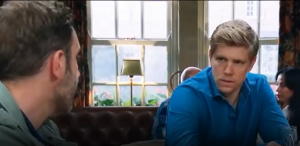
This storyline is primed to run deep, and the reunion acts less as a resolution and more as the kindling for further conflagration. The emotional fallout promises to entwine with Jon’s secrets, Aaron’s agonising loyalties, and Victoria’s growing suspicions as she inches toward uncomfortable truths. The upcoming crossover with Cory Dale week offers the perfect stage to amplify consequences and broaden the ripple effects across familiar faces, but even without spectacle the intimate human cost remains the beating heart of the drama: when the person who broke you is also the only one who can hold you, what does moving forward actually mean? The Robron moment gives viewers the earned, messy, honest reunion they craved while also asking an unforgiving question — is this the start of a second chance, or the quiet before Jon detonates everything?
